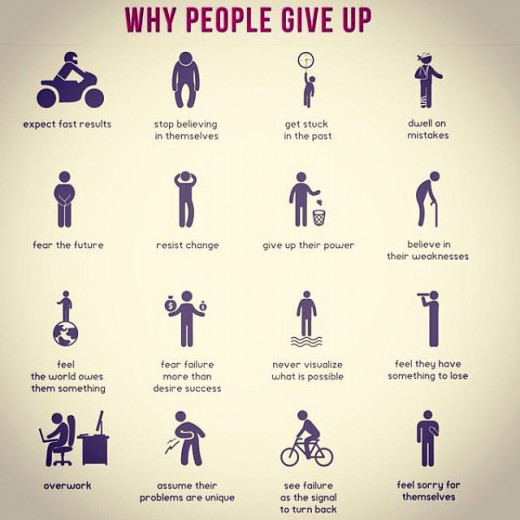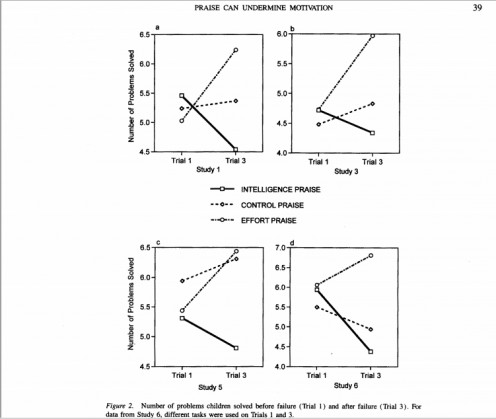The effects of beliefs on mindgrowth

What is this about?
We were all trained to believe in things such as "talents" and "destiny". Almost everyone has that thing that they are truly "good at" and attain to that one thing whether by choice or by thinking they cannot perform that in which they truly wish they were. There are a lot of people who suffer with the feeling that they are not truly good at anything and feel inadequate, as if everyone has a "destiny" and there they are still trying to figure out theirs, do you see how things kind of sum up and can be very harmful?
This issue is not harmful only towards people who feel misplaced or "useless" but also to people who believe they are already really good at what they do and/or generally intelligent.
Mueller, Claudia M. and Dweck, Carol S. conducted a study on how "Praise for intelligence can undermine children's motivation and performance". Sure, the study was conducted on kids but then there is Haimovitz and Henderlong-Corpus' "Effects of Praise on Motivation in Emerging Adulthood" that performs a similar research on college students so unless you were developed in any other way than childhood and college (in which case, I am deeply sorry and you are okay to leave), yeah that goes for you too.
![All children were told: "Wow, you did very well on these problems. You got [x] right." No matter the actual score. All children were told: "Wow, you did very well on these problems. You got [x] right." No matter the actual score.](https://usercontent2.hubstatic.com/12431539_f496.jpg)

The sense of prediction and control
Jason E Plaks, Carol S. Dweck and Heidi Grant: "Violations of Implicit Theories and the Sense of Prediction and Control: Implications for Motivated Person Perception" proposes in their very beginning that personal theories and beliefs play a key role in establishing and maintaining people's subjective sense of prediction and control competence and that people are heavily investing on believing that said theory is correct rather than using such as "a rule of thumb"(that which may be refined, overruled or discarded).
In their conclusion they state that: "Implicit theories generate concrete predictions about how human beings tend to act, but as we have shown in this article, these predictions are not always tested in an optimal manner. Perceivers appear to engage in motivated processing distortions that favor the preservation of their working theory."
In other words, even researchers, that have presented deterministic articles in the past, were attaining to their own personal beliefs while conducting their studies, leaving behind biased articles that lead us to believe that they were stating universal truths and principals on humanity.

So great, what does this have to do with my beliefs?
Now I'm assuming the fact that there is given research was enough and you did not read through the actual paper. If you did, you can jump straight ahead to the next string, if not, let me explain in some simple terms why your personal belief might be in your way.
You see, when you believe in things like "left-brain/right-brain" or "talents" or "I.Q. as applicable to what you are able to learn" you are telling yourself you are not capable of learning something new. You are telling yourself that predetermination is what is stopping you.
Now, even those who do not believe in personal talents and such may be subject to anxiety and frustration, leading to failure:
One of the final considerations of "Violations of Implicit Theories[...]" is
"In other words, entity and incremental theorists both appeared to become more deliberate and methodical after being presented with theory-violating information than after being presented with information that either confirmed or was irrelevant to their respective theories."
Also interesting that:
"In sum, under high cognitive load, both entity and incremental theorists exhibited faster RTs only to behaviors that violated their respective theories. This can be taken as evidence that the phenomenon of selective attention in the name of theory protection applies to both entity theorists and incremental theorists and may well be a generally pervasive phenomenon"
Although the "Incremental Theorists" believe that there is no such thing as predetermination and that you can learn anything, the mere fact that their beliefs were put in check put them in dismay and left them anxious. They would avoid obtaining contrary information on pretty much the same scale as "Entity Theorists" (those who believe in inherent skills and talents).
In other words, it really doesn't matter what most people believe in but they are willing to hold on to it. It doesn't matter if it ends up looking incoherent. This might be the part where you're laughing and thinking about every religion or view that is different than yours and do you know the real funny part? You do it too.
Everyone has some very personal belief or rule that, to some extent, is incoherent with what we know of reality and although it is not a healthy habit, some people may feel a sense of loss or even depression if dis proven from certain beliefs, therefore it is better to just give them the contrary information so they can digest it themselves and just leave them alone if they don't seem to change their minds.
So what can you hold on to in this crazy world?
Well, maybe Ilya Prigogine may say it better with: "In order to predict the behavior of a chaotic system you may have to know the initial conditions to an infinite degree of precision." but I have another way of saying it: There are few things that can be predicted or determined in this world and those things are only relevant if purely absolute and concrete. All you have to do is keep an open mind and be willing to let go of non-empirical concepts that someone said it was a good idea to plant in our heads.
So the next time you see that Anti-vaccine dude from across the street, just leave some epidemiology research and the history of how viruses were contained alongside a few Discover and Scientific American magazines at his doorstep and leave him alone.
So how can I use this to be a better learner?
Glad to see you made it up to here and are ready to learn new things!
The first step is to actually absorb what is there, do not worry about not being good or that you have no talent or you're an "artsy person" and we're talking about math.
Those concepts do not exist. They were developed by people searching for a deterministic view on the world and as some of you may know from quantum physics, John Stewart Bell has said it well with: "There are events whose outcome is not determined by any hidden variables within the accepted scientific world view."
I separated a few helpful videos and links to help you thrive on your new goals and expectations now that you are free of all misconceptions and ready to launch.
The Personal Paradigm Shift: How to Re-Shape Core Beliefs - Living the Inner Life
The first 20 hours -- how to learn anything | Josh Kaufman | TEDxCSU
Links
- Character Lab
Character Lab is a non-profit bridging the science of character development with the daily work of teaching so all kids can fulfill their potential. - Cognitive Load Theory - Learning Skills From MindTools.com
Make your training delivery more effective by presenting information in a way that fits with how learners' minds work. - Student Motivation through a Growth Mindset, by Carol Dweck, Ph.D.
Brainology is an online interactive program in which middle school students learn about how the brain works, how to strengthen their own brains, and how to better approach their own learning. In the process they develop a growth mindset. - HSC Online - How does the acquisition of skill affect performance?
Exam material and other resources to help you succeed in your HSC. A Charles Sturt University (CSU) initiative developed in collaboration with the NSW Department of Education, Science and Training. - 12 Things You Do That Are Holding You Back From Success
The biggest thing holding us back from success is usually ourselves. Here are 12 things you might be doing that are holding you back.
Opinion Poll!
Do you want more scientific articles on mindgrowth?
Carol Dweck's book on Mindset
© 2015 Meghan Mitchell








